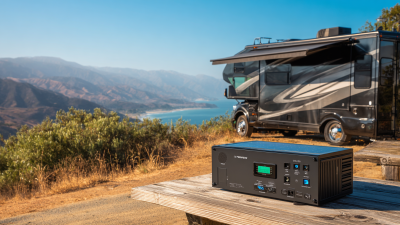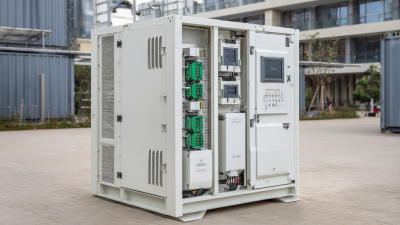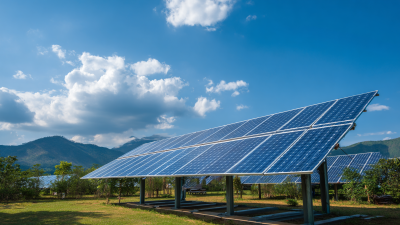
As the popularity of RVing grows, so does the need for reliable power solutions that allow adventurers to explore the great outdoors without sacrificing comfort. One of the most effective ways to achieve this is through an RV Off Grid Solar System. According to a recent report by the RV Industry Association, over 40% of RV owners are seeking off-grid capabilities, highlighting a significant trend towards sustainable travel. The right solar system not only provides the freedom to camp in remote locations but also contributes to reducing our carbon footprint. With advancements in solar technology, many RV enthusiasts are now investing in systems that maximize energy efficiency and minimize reliance on traditional power sources. In this essential checklist, we will explore the benefits of choosing the perfect RV Off Grid Solar System, ensuring your adventures are powered sustainably and efficiently.

When embarking on off-grid adventures in your RV, understanding your power needs is crucial for a seamless experience. Start by calculating your energy consumption, which is the sum of the wattage of all devices you plan to use. Consider how many hours each device will operate daily to estimate your total watt-hours needed. This calculation will guide you in selecting an appropriate solar system that can meet your needs, ensuring you're not left in the dark while enjoying nature.
**Tips for Assessing Your Energy Needs:**
1. **List Your Appliances:** Identify the devices and appliances you plan to use, such as lights, appliances, and tech gadgets. This will serve as your foundation for calculating energy consumption.
2. **Wattage and Usage Tracking:** Use a wattage meter to check the consumption of your devices to get accurate readings. Keep track of how many hours each device will operate, especially during peak usage times.
3. **Factor in Efficiency:** Choose energy-efficient devices and appliances to minimize consumption while maximizing performance. Incorporating modern energy-efficient options, like quiet air conditioning systems, can help extend your off-grid capabilities, affording you more time in nature.
With a solid understanding of your power consumption, you can confidently select the perfect off-grid solar system that meets your unique adventure requirements. Look for solar panels that offer high efficiency, as they will provide better performance and faster charging capabilities, ensuring you remain powered no matter where your travels take you.
| Appliance | Wattage (W) | Daily Hours of Use | Daily Energy Consumption (Wh) |
|---|---|---|---|
| Refrigerator | 120 | 24 | 2880 |
| LED Lights | 10 | 5 | 50 |
| Laptop | 60 | 4 | 240 |
| Water Pump | 50 | 1 | 50 |
| Mobile Device Charger | 10 | 3 | 30 |
| Total | 3150 Wh |
 When selecting solar panels for your RV off-grid solar system, understanding the types and features is crucial for maximizing efficiency. There are three main types of solar panels: monocrystalline, polycrystalline, and thin-film. According to the Solar Energy Industries Association (SEIA), monocrystalline panels are known for their high efficiency rates, often exceeding 20%, which makes them the optimal choice for space-constrained RV setups. Their sleek design and increased efficiency mean that more power can be generated in less space, which is vital for off-grid adventures.
When selecting solar panels for your RV off-grid solar system, understanding the types and features is crucial for maximizing efficiency. There are three main types of solar panels: monocrystalline, polycrystalline, and thin-film. According to the Solar Energy Industries Association (SEIA), monocrystalline panels are known for their high efficiency rates, often exceeding 20%, which makes them the optimal choice for space-constrained RV setups. Their sleek design and increased efficiency mean that more power can be generated in less space, which is vital for off-grid adventures.
In addition to panel type, consideration of additional features can enhance efficiency. Look for panels with high-temperature coefficients; as temperatures rise, panels with low coefficients will produce power closer to their rated capacity. Moreover, a study by the National Renewable Energy Laboratory (NREL) indicates that solar panels with an anti-reflective coating can improve energy capture significantly, by up to 5%. Coupled with effective battery storage systems, your off-grid solar system can provide consistent energy, allowing you to enjoy your adventures without worrying about power availability.
When embarking on adventures in your RV, choosing the right off-grid solar system can significantly enhance your experience. The essential components to consider include inverters, batteries, and charge controllers, each playing a crucial role in optimizing your energy use. Inverters convert the DC electricity generated by your solar panels into AC power, which is necessary to run most of your household appliances. It's vital to select an inverter with adequate capacity to meet your power needs, ensuring that everything from your fridge to your entertainment system operates smoothly.
Batteries are another critical element, as they store the energy produced by your solar panels for use during periods of low sunlight. Opt for deep-cycle batteries that can endure frequent charging and discharging without compromising their lifespan. Lithium batteries, while typically more expensive, offer faster charging times and a longer life compared to traditional lead-acid options. Finally, charge controllers regulate the flow of electricity to and from your batteries, preventing overcharging and extending battery life. Selecting a high-quality charge controller ensures that your off-grid system functions efficiently, allowing you to enjoy your adventures without concerns about power management.

When it comes to installing an RV off-grid solar system, one of the primary considerations is whether to take the DIY route or hire a professional. Choosing to go DIY can be a rewarding experience that saves you money and allows you to customize your setup. However, it is crucial to have a solid understanding of solar technology and electrical systems. Before you begin, gather all necessary materials, such as solar panels, batteries, charge controllers, and wiring. Familiarize yourself with the installation instructions and local regulations regarding solar systems to ensure compliance.
On the other hand, a professional setup offers peace of mind and expertise that can be invaluable, especially for those who may not be technically inclined. Professionals can assess your RV's specific needs and recommend optimal configurations for efficiency. If you opt for a professional installation, be sure to check their credentials, read customer reviews, and obtain multiple quotes to find the right fit for your project. This way, you can enjoy your off-grid adventures without the stress of improper installation or unsafe electrical practices.
Maintaining your off-grid solar system is crucial to ensure it operates at peak efficiency during your adventures. Regular checks on the system components—like batteries, panels, and inverters—are essential. Look for any signs of wear and tear, such as corrosion on the terminals or physical damage to the solar panels.
Tips: Schedule routine inspections every few months to keep your system running smoothly. Make sure to clean the solar panels regularly to remove dirt and debris that can hinder performance. Also, monitor your battery health, as a well-maintained battery extends the overall lifespan of your solar system.
Upgrades can also enhance your off-grid solar experience. Consider investing in more efficient solar panels or a battery management system to optimize energy usage. Additionally, incorporating a charge controller can prevent overcharging and extend battery life.
Tips: When planning upgrades, assess your current power needs and estimate future demands. This will help you make informed decisions when selecting components that can grow with you and your adventures. Keep an eye on emerging technologies in solar energy—innovations appear frequently that could significantly improve your off-grid setup.





